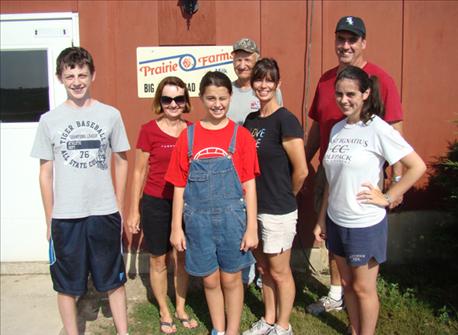
All across Illinois agriculture and throughout the election cycle, there’s been a continuing refrain: January 2017 will bring fewer farmer-legislators in Springfield.
“It’s not just been this election cycle, though,” says Kevin Semlow, Illinois Farm Bureau director of state legislation. “For several election cycles, we’ve been seeing declining numbers of members of the General Assembly that are directly tied to agriculture.”

FARM FRIENDS? Says Illinois Farm Bureau’s Kevin Semlow, “For several election cycles, we’ve been seeing declining numbers of members of the General Assembly that are directly tied to agriculture.”
Sen. John Sullivan, D-Rushville, will retire in January after 14 years in the Illinois Senate, as will Rep. Don Moffitt, R-Gilson, after 23 years in the Illinois House. Semlow says several farmer-legislators or legislators with farm interests remain, including Rep. David Reis, R-Willow Hill; Rep. Charlie Meier, R-Okawville; and Rep. Norine Hammond, R-Macomb.
Semlow says the fact that fewer farmer-legislators exist is not surprising, given that the number of farmers is shrinking as well. But he says it does change IFB's approach as a farm organization.
“Most of the General Assembly members don’t have the personal, practical, hands-on experience in agriculture, but they’re good about coming out and learning,” he says, adding that they’re able to get most members of the Legislature out to farms.
“They’re willing to learn,” he says.
Some of that happens through IFB’s Adopt-a-Legislator Program, which pairs an urban legislator with a downstate county Farm Bureau to let them see what’s happening in the countryside.
Farmer-legislator view

ON THE FARM: “Most of the General Assembly members don’t have the personal, practical, hands-on experience in agriculture, but they’re good about coming out and learning,” says Illinois Farm Bureau’s Kevin Semlow, adding that they’re able to get most members of the Legislature out onto farms through the Adopt-A-Legislator Program. (Photo: Elaine Stone, Fulton County Farm Bureau)
Reis, who’s represented the 109th District for the past 12 years, says his conversations with non-ag legislators continue to evolve. He recalls debates about securing anhydrous ammonia from methamphetamine makers where non-ag legislators suggested that perhaps thieves “needed” it. Reis was able to explain how volatile anhydrous is and how there is no good reason to steal it and haul it in an open cooler in the back of a car. He’s also been able to offer perspective on tail docking and other animal welfare issues.
Reis has seen the number of farmer-legislators fluctuate over time, from nine when he started down to five, and then back up again.
“I think the biggest thing is we just won’t have anybody in the Senate that comes from a farming background or farms on a day-to-day basis,” he adds. Bill Cunningham, D-Chicago, will replace Sullivan as chairman of the Illinois Senate Agriculture Committee.
“I’m the only pork producer in the House or Senate. Brad Halbrook, R-Shelbyville, who’s replacing Adam Brown, R-Champaign, and Dan Swanson, R-Alpha, who’s replacing Don Moffitt, both have beef experience,” Reis says, adding that Bob Pritchard, R-Hinckley, and Randy Frese, R-Paloma, both have agricultural backgrounds and interests.
Reis says he relies on Farm Bureau and the Illinois Pork Producers Association to help educate nonfarmer-legislators.
Challenges to ag?
Semlow says the lack of a budget takes focus off of everything else right now. “Until we get the state back on fiscal soundness, a lot of industries are being left by the wayside. That’s the all-consuming focus of energy.”
He’s also not optimistic for a budget anytime soon.
“I anticipate we’ll see more of the same we’ve seen over the last 14 to 15 months,” Semlow says. “I think we’ll see more stop-gap budget measures over the next 18 months.”
The challenges for agriculture are many, given the way the Illinois Department of Agriculture budget has been gutted, and that makes it hard for organizations like IDOA, soil and water conservation districts, county fairs and Extension to consistently plan ahead.
“How do you run a yearlong grant program when you get three to six months’ worth of funding?” Semlow asks. “You really can’t plan ahead.”
That, in turn, affects staff retention and turnover of experienced people. Semlow says people have chosen to move on and not stay with those organizations.
“If you have the opportunity to take a job that’s more stable, you have to look at it. But we’re losing the institutional knowledge that was there for many years,” he says.
About the Author(s)
You May Also Like






